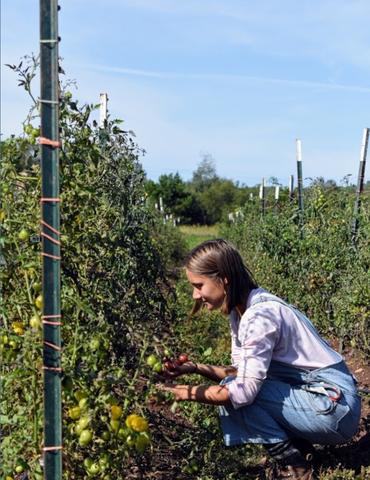If you attended Fall Fest last September at the UMD Land Lab, formerly known as the UMD Sustainable Agriculture Project (SAP) Farm, you may have seen a familiar face in a new role. Cole Grotting (Environment and Sustainability ’19) started working as the Farm Operations Manager at the UMD Land Lab in July and is harnessing his degree to enhance lives now and into the future.
The Land Lab provides a unique partnership for UMD courses and a space for hands-on learning around a theoretical concept. Grotting explained, “The Land Lab operates as a functioning organic farm, but our mission is to use the farm as an outdoor classroom to support active learning, programming, and research opportunities for students, youth, and community members. Our site can be used to learn about a variety of topics including food systems, sustainability, food justice, ecology, GIS, soil and water quality, and weather and climate. We have about ten acres of organically-managed farmland, a five-acre apple orchard, a hoop house, a small apiary (honey bees), a root cellar, several acres of forest, and a weather station, all of which are resources for UMD students to collect data in a variety of different fields of study and complete a course or research project.”
As an undergraduate, Grotting served as a student worker at the Land Lab for two seasons. Though he learned much about sustainability in the theoretical realm during his undergraduate education, implementing sustainable practices on the farm opened his eyes to how much work it can be in execution. Nevertheless, Grotting stated, “It is immensely rewarding to care for the land so directly and contribute to that intimate, beautiful process of growing food.”
The Land Lab hires six to eight interns each summer, but hundreds of UMD students, youth groups, and community members visit the site to have discussions and collaborate on projects. Grotting believes, “When students get the opportunity to actually do something with their hands and apply what they are learning about to something more tangible, it makes them ask a lot more questions and have more of an interest in fully understanding course material.”
The vast majority of the students who work with the Land Lab will not become farmers, but Grotting emphasized that “every single one of them will surely be interacting with food systems every day for the rest of their lives.” In fact, the majority of the Land Lab’s produce is currently sold to UMD’s Dining Services and served in Superior Dining. “The work we do at the Land Lab is less vocational training (although for some it may be) and more about creating educated, mindful consumers of food and developing knowledge that changes our relationship with our environment in a positive way.”

Side note:
Bringing in more revenue and getting on more solid financial footing is the Land Lab’s biggest challenge. One approach they are taking this year is starting a campus CSA (community supported agriculture), where faculty, staff, and students can purchase produce shares and receive a box of fresh vegetables every week throughout the summer. If you are interested in purchasing a share, forms can be found in the Geography and Philosophy Department office: 324 Cina.